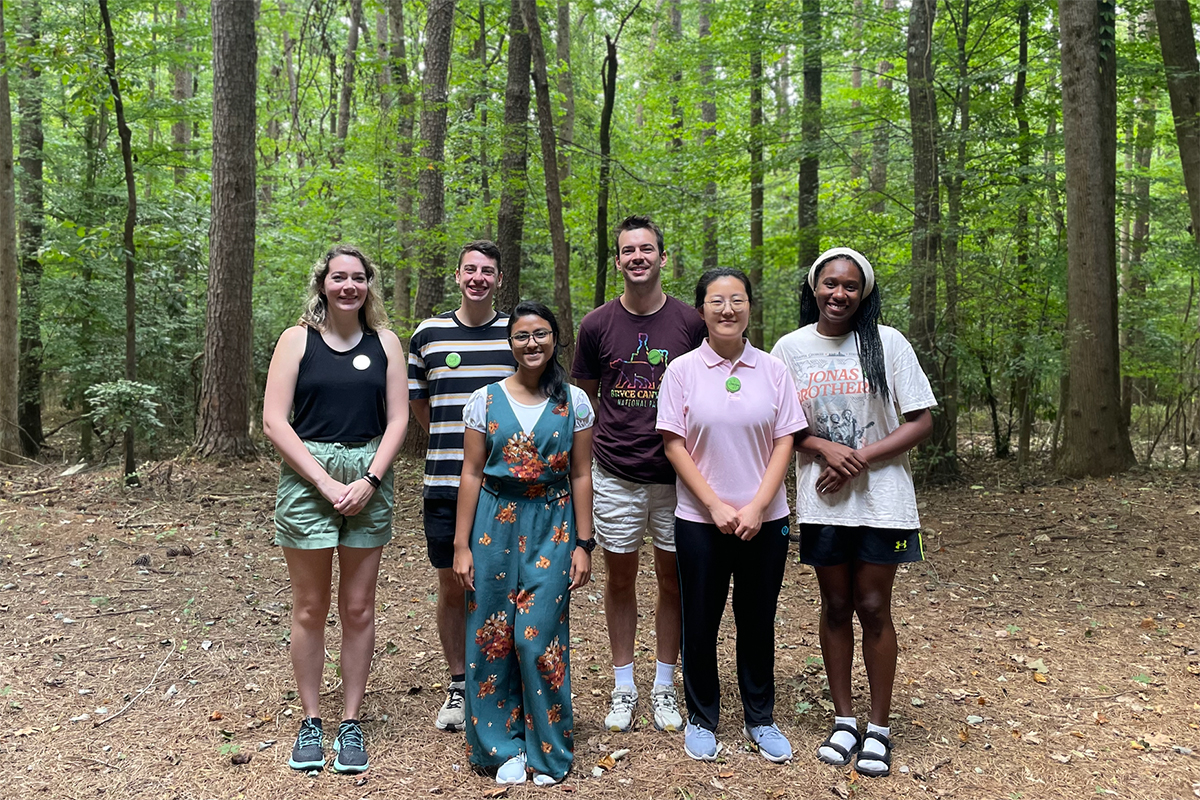Surrounded by tulip poplars, loblolly pines and beech trees, the Luce Center served as an inspiring backdrop for the 2024 Piedmont Project and its sister program the Piedmont Teaching Assistant Training and Teaching Opportunity Program (TATTO) in August.
Sponsored by the Emory Office of Sustainability Initiatives (OSI), the Piedmont Project is an annual two-day interdisciplinary summer development program that provides faculty members with the tools, connections and inspiration to infuse sustainability and environmental issues into their classrooms and beyond. TATTO is a one-day version of the same program, focusing on graduate students who teach at Emory.
Since Peggy Barlett, Goodrich C. White Professor of Anthropology, founded the program in 2001, it has served approximately 300 faculty members and 200 graduate students. This year, seven graduate students and nine faculty members from 10 Atlanta and Oxford campus departments participated in the Piedmont Project.
Lydia Fort, assistant professor in theater studies at Emory University and a faculty fellow at OSI, led meaningful discussions with the participants, including overcoming barriers to integrating sustainability into teaching.
“It was truly inspiring to witness this incredible group of educators — faculty and graduate students alike — come together during the Piedmont Project and TATTO program,” says Fort. “The bonds formed between participants were palpable, and they shared how energizing it was to start the school year with such an enriching experience. Our group included faculty who hadn’t yet taught their first class to postdocs and newly tenured professors, all exchanging insights and learning from one another.”
The participants advanced their understanding of the history of sustainability at Emory by listening to presentations from Bree Ettinger, associate teaching professor in the Department of Mathematics, and Ciannat Howett, the associate vice president of sustainability, resilience, and economic inclusion at Emory. These presentations galvanized participants to brainstorm ways to include Emory’s land and nature in their classrooms.
In addition, Justin Hosbey, assistant professor of city and regional planning at UC Berkeley, joined the faculty participants as a guest speaker and inspired conversations around environmental justice with his project on Black ecologies.
Hosbey’s project highlights how Black communities in the southern U.S. and African diaspora are disproportionately affected by climate change, including rising sea levels, land subsidence and harmful environmental practices. It also emphasizes the rich body of knowledge produced by these communities, offering insights into understanding the current crisis and imagining sustainable futures beyond destruction.
Eri Saikawa, Winship Distinguished Research Professor in the Emory Department of Environmental Sciences, explained the science of climate change and presented data from a global perspective to the participants. Later, Justin Burton, associate professor of physics, shared his sustainability course materials with the faculty to showcase how to address global issues and local challenges in lectures.
At the end of both the Piedmont Project and TATTO programs, faculty members and students enjoyed a walk in the woods with Anthony Martin, professor of practice in the Emory Environmental Science Department. Immersed in the sounds of South Fork Peachtree Creek, participants reflected on their learning experiences during the program and prepared to integrate sustainability into their syllabi.
Faculty members and teaching graduate students interested in participating in the Piedmont Project next year should visit the official website for more details.

Graduate students who teach at Emory are eligible to participate in the Piedmont Teaching Assistant Training and Teaching Opportunity Program, which is a one-day version of the Piedmont Project program for faculty. Participants included (left to right): Lesenia Fish, Mitchell Scott, Sreejani Chaudhury, Francesco Brarda, Qingqing Lei and Amelia Ali.

